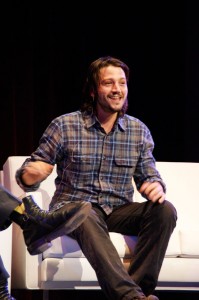Cinema for the people
On Monday, actor and director Diego Luna paid a visit to USC to share his views on the impact of the cinema industry.
He sat down with Annenberg professor Josh Kun in Bovard Auditorium and discussed his film career, Mexico and living the American Dream.
Luna, famous for his roles in the Mexican cult classic Y Tu Mamá También, as well as American films such as Dirty Dancing: Havana Nights and the Academy Award-winning Milk, appeared onstage amid purple, orange and yellow lights to an eruption of applause from the audience.
The Spectrum event was part of the USC Annenberg Distinguished Lecture Series on Latin American Arts and Culture in association with the USC Mexican American Alumni Association.
Kun and Luna engaged in an intimate conversation for more than an hour and a half, concentrating on Luna’s film work and the meaning behind his roles.
“How film can affect you is amazing,” Luna said. “The journey is what you keep and what makes you grow.”
A trailer from Luna’s movie Abel — his second outing as a director after helming 2007’s documentary J. C. Chavez — was shown near the beginning of the event and was greeted with enthusiastic whistles, laughs and applause.
The film centers around a young boy with the titular name who is forced to fill his absent father’s shoes as the man of the house, and mixes family drama with an undertone of the paranormal.
Kun questioned Luna on the overarching themes of the film — specifically, what the film says about the transition between childhood and adulthood.
“[Abel] starts to behave like a grown-up,” Luna said, explaining the driving focus of the film.
Luna addressed the contemporary problems of children trying to grow up too fast and admitted that he had failed to abide by this advice as a child. Luna said he wants to make sure that his own children can enjoy their childhood and not take on adult roles too young.
Luna elaborated on his belief that all children deserve two parents and discussed the difficulties that single parents face. The film reflects his beliefs, Luna said, as Abel’s mother struggles to raise her children by herself after her husband leaves.
“[Parenthood is] a responsibility that’s meant to be shared,” Luna said. “I believe a kid needs a father every day. That’s the way it should be … In Mexico, you have all these broken families where fathers leave for the United States.”
Aside from the movie, Kun and Luna spent a large portion of their time talking about acting as a career.
“Everything I’ve done in my life … got me here,” Luna said. “Acting is about curiosity, knowing who you are.”
The majority of Luna’s hardships, he said, stem from his childhood in Mexico. Growing up, his father repeatedly begged him to become anything but an actor, but Luna persisted with his dream despite the objections. Luna looks back at his start as an actor with a calmer outlook tempered by his efforts to break into Hollywood.
Luna also said he believes political tensions and economic disparity hinder social progress in Mexico. This issue of the general welfare of Mexican citizens is immensely important to Luna, and he is trying to make sure the film industry does its part.
“There’s a lot of talent in Mexico, but there’s no infrastructure for that talent to explode. I believe cinema can help,” Luna said.
Luna delved deeper into specific social issues, stressing that unity is key for Mexico’s growth. He brought up an earthquake that struck Mexico in 1985, saying it helped unify the people of Mexico in a time of great need.
“I believe the earthquake was kind of a shake for our generation,” he said. “There was a feeling of connection … a generation that is connected and knows it’s a part of something bigger.”
Returning to Luna’s acting career, Kun asked about his breakout starring role in the 2001 film Y Tu Mamá También and the difficulties in playing a character struggling with his sexual identity.
“It’s all about understanding [and] allowing someone to be different,” Luna said.
Luna’s character in Milk, Jack Lira, also faced societal challenges concerning his homosexuality and ethnic status as a Mexican-American in the 1970s.
During the discussion, a clip from the 2007 movie Mister Lonely played, in which Luna portrayed a Michael Jackson look-alike entertainer who meets Marilyn Monroe at a retirement center.
Afterward, Kun ended the onstage interview, opening the floor up for questions from students. Although the topics ranged — and many of the questions were extremely specific to certain parts of Luna’s career — one overarching trend emerged: Students wanted to know Luna’s views on events in Mexico. One student asked for Luna’s views on Mexico’s political and social progress.
“I’m happy because there’s hope,” Luna said.
Throughout his conversation with Kun and other students, it became clear that the actor is genuinely optimistic for the future of Mexican and American cinema and the eventual interconnection between the two. He disregarded the idea of national cinema, instead supporting cinema as a borderless industry.
“Films shouldn’t have a passport,” Luna said. “We should just talk about film, period.”

